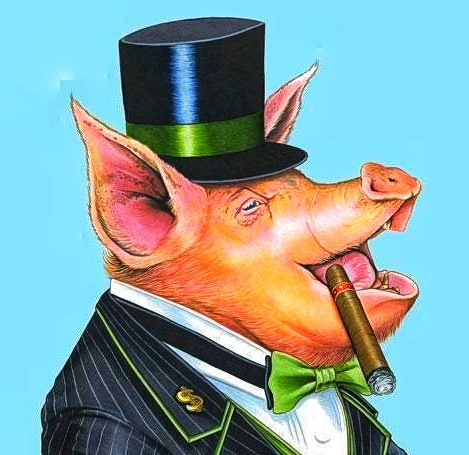I guess similarly, how do you actually deal with the "Individual people are not actually naturally equal in their capacities", problem?
Are these even questions that people who are Anarchists care about, or what?
I'm genuinely not trying to start a "thing" here, these are just questions that I feel like I've honestly just never got substantive answers on regarding Left-Anarchist political philosophy.
Speaking from over 5 years of organizing in an anarchist milieu.
It is essential to recognize that informal power structures are the precursor and basis of formal power structures. Any anarchist will need to take this into account to be even minimally effective, and would help the praxis of any communist too.
The best general strategy for responding to this is to encourage horizontalism in practice: as soon as you notice that you have a substantially higher level of skill in some area, teach others to bring them up; if you notice that you are a social connector that people coalesce around, pull the strings to connect the less-connected with each other. Have a good sense of how much input is "your fair share" and when to step aside and let someone else take the spotlight. But you can't do this unless you've developed trust in numerous people.
There is a social terrain that's largely defined by clumps. IMO it's always been this way and always will be. I don't really have an answer to it getting to the point where you can call it cliques, but it's much less hazardous if you don't have the potential for one clique to take control of the single/central dominant hub.
That sounds like it would work in a small circle, but how would this play out on a hypothetical large anarchist territory? Would you have some sort of watchdog institutions?
How do you deal with people that live in an anarchist territory but don't subscribe to an anarchist ideology?
It seems to me anarchism can only truly work when everybody is a dedicated anarchist, which is IMO unreasonable to expect right after a revolution.
Sure, but how does the revolution get done without political repression of other ideologies? And if you think that's necessary how would exactly an anarchist revolution be different than a marxist one?
Marxists recognize that the prevalence and dominance of ideologies is heavily influenced by material conditions.
The anarchist contribution to this is suggesting that reactionary ideologies are not very stable, take a lot of resources and logistics to uphold, and could be disrupted more easily.
Expropriated capitalists are not much of a threat; you can't raise an army without capital. I will concede that foreign powers are still a threat that anarchists have not come up with as solid of an answer to.
I'm gonna invoke the bees again.
Of course it isn't a solution that you put in place and the format takes care of everything; you need people to become accustomed to the horizontal power structure.
In a large territory you're talking about macro-social trends, and I don't know if "demagoguery", "interpersonal prejudice", and "social cliques" have the same implications in that context.
the state doesn't step in to handle those things now or under any other systems
also demagoguery is just using standard rhetorical techniques with a populist message
the state doesn’t step in to handle those things now or under any other systems
I would argue that the Soviets did a good deal to handle interpersonal prejudice as a major systemic problem in the political system; and similarly with regards to the ways that differences in personal abilities can negatively effect ones social & economic standing. Other problems, like social cliques coming to dominate/monopolize power & governance though, yeah I suppose they didn't do the best job of preventing.
also demagoguery is just using standard rhetorical techniques with a populist message
I suppose I'm using the term as a shorthand for "reactionary persecution of social minorities". :shrug-outta-hecks:
cliques are a somewhat unavoidable aspect of human society i would argue. it would be nice if everyone could get along but we should plan for the fact they might not. In terms of avoiding cliques dominating governence I guess elections would be the only thing for it (they aren't 100% effective at that butt what can you do. We aren't pitching to replace a perfect system)
IMO the first widespread anarchist society will only be able to succeed when the people within that society have been raised under socialist conditions. If you tried doing anarchism in America today it's going to break down into violently competing cults, because that's how we've been conditioned.
The Fellowship for Intentional Community has several people who have done a deep analysis of their communizing work, and one of their conclusions is something along the lines of this: that people who are really ideologically and personally committed are able to fit into anarchistic modes within just a few months, but for most people it would take many, many years.
Makes sense to me. With some dedicated comrades and some land we could have functioning anarchy in a week, but my main concern is the world system and the billions who are unable to just "drop out" like that. Almost as if some kind of transition is needed
Oh, certainly.
Year 1-3: Turn on
Year 2-4: Tune in
Year 3-5: Drop out
Demagoguery is the easiest. Either you deliver or you don’t. You can’t just talk shit. Oh you found ten people who agree with you? Go do your stuff for free, if you can’t convince the rest of people to support you, you don’t get the labor value as you are doing something seen as useless.
Avoidance or mediation. How do people deal with interpersonal prejudice now?
Cliques doesn’t seem like an issue easily dealt with, you can only introduce constant intermixing of people in assignments. But same is true everywhere.
Equal in capacities - eh, same true with communism, I don’t think people figured out consistent/fair way to do distribution based on productivity. You either do flat hours (everyone equal), flat hours or production norm (productive workers finish earlier), production output as a part of whole output (might be discouraging for less productive workers), or weaker link between productivity and compensation (like do 20 percent more receive 10 percent more)
is it the role of the society at large to prevent cliques. That's just how well people get on I'd argue they should handle that themselves
That’s just how well people get on I’d argue they should handle that themselves
"How well people get on", can be innocuous, it can also be a way by which to monopolize social & political power.
are we meaning the same thing by cliques because when i hear clique I think of a friend group that aren't very open to outsiders of the friend group. Kind of mean not really much of a social ill on the macro scale
Innate differences do not necessitate hierarchies. Someone can be better at something than someone else without a hierarchy being formed off of that difference. There’s value judgment and measurement, but they don’t have to go hand in hand, and they definitely don’t universally. I can be better at turning a shoe into a projectile than someone else but there’s no additional hierarchy formed off of that. I can be the best jumper without the authority to tell other people how to jump.
So I wanna say; I don't disagree with you in saying that there isn't anything about innate differences that logically necessitates hierarchy (and indeed, I would personally prefer if it didn't). However it is my opinion, based off of my personal experience as somebody with ASD, that those differences are very likely to elicit value judgments whether that's formally recognized, or not. One of the reasons why I tend to prefer formal & explicit systems of power (such as States), over informal ones (which I think would ultimately still exist within a nominally Anarchist society tbh), is because it gives a definite entity & structure one can appeal to (or challenge!) for redress & compensation for violation of ones social rights.
My concern with an Anarchist social order, is that much like the way that the "Free Market" aims to make invisible the structure of Labor Exploitation & Class Power at the heart of Capitalism. The devolution of social structure down to the free-associative networks of disaggregated individuals that (IMO) Anarchism generally seems to aim towards, could plausibly render invisible all manner of forms of interpersonal prejudice & systematic biases against social minorities & the disabled.
That's at least I think the best way I can articulate my core concern at the moment.
similarly, how do you actually deal with the “Individual people are not actually naturally equal in their capacities”, problem?
This one has a more satisfying answer. Separating many of the executive (or specialized) functions into multiple domains, where no domain can be plotted as more important or less important than the other, having a council that sets the highest standards for these domains, and limiting how many domain councils one person can be a part of.
Yes, it's a hierarchy. But it's not a totalizing hierarchy, it's something that is well-balanced.
Reeducation camps to the title question
Im not sure what the "naturally equal" question is about. Anarchists recognise differences in knowledge, skills, capabilities, etc
Who selects the guards? Who trains them? Who develops the procedures? Who comes up with the reeducation material? Who coordinates the emergency responses? I have seen non-hierarchical emergency responses and it's always a clusterfuck that exacerbates the emergency
Go and argue with the guy who took the first question seriously too
run by the community, with pre-established programs, hierarchies, etc as decided by the community. this doesnt mean that everyone in the community will decide how the reeducation camp functions exactly day to day. it means everybody had a say on how the decision making was to happen (i.e. the whole community decides how the reeducation camp will be structured, who will be drafting and overseeing the reeducation programs, who will be conducting safety audits and with what frequency will take place, etc)
Most people don't have the time to become an expert on that and 5,000,000 other topics related to running a just society to ensure that no abuse is taking place
I agree, this is basically Zizek's criticism of anarchism: "most people don't want to be politically mobilized all the time and would rather cede power to some bureaucrat to handle it for them"
Well if under capitalism everybody is too crushed busy demoralised tired alienated to care enough about collective endeavours theres just no chance that could change under socialism
Exactly, that's why they delegate tasks to whoever they see fit. I specifically said not to think everybody is involved in everything. Some tasks they may decide to allocate through a lottery system, some tasks they may decide to allocate through general elections, some tasks they may allocate by panel of experts. Its not that difficult if you remember these are adult human beings.
You'd be surprised at how much work that administrative organizing and delegating is, especially when there's no process or standards in place.
Worked at a place like that, about 3 people ended up doing 90% of the work, got burnt out, quit, leaving no one to do anything. I had to stop doing 90% of the work and spend the next 6 months trying fruitlessly to get anything organized until I got burnt out and quit.
Anarchists recognise differences in knowledge, skills, capabilities, etc
They recognize them, but what do they do about them? How do they seek to systematically limit the negative impacts of having lower-than-average social, or cognitive abilities, for example; especially without a formal State to redistribute resources & prescribe/enforce rights?
a society built on anarchist principles is not free from rules, systems, organisation, etc .
i assume you are an ML, your final destination is the same as us anarchists, so maybe you already have answers to these questions.
i think this series of brief videos by noncompete can help: https://www.youtube.com/watch?v=ZzEl5RIMp7M&list=PLCcemL_x8RtdtFuib1Wl6VwyuYOEDb5Wv
How do they seek to systematically limit the negative impacts of having lower-than-average social, or cognitive abilities, for example; especially without a formal State to redistribute resources & prescribe/enforce rights?
You know as well as I do that this is not a problem with dependent people existing, but a problem with capitalism (or more generally, any stratified money-based economic model).
A large fraction of the population is willing to assist those who are incapable of looking after themselves, and always has been. The difficulty is when they can't afford to do it. And that's pretty easily solved by expropriation.




